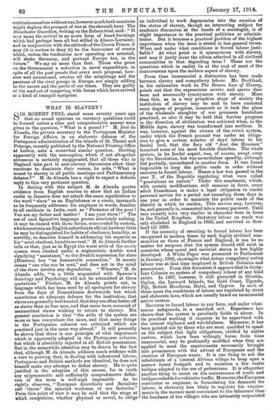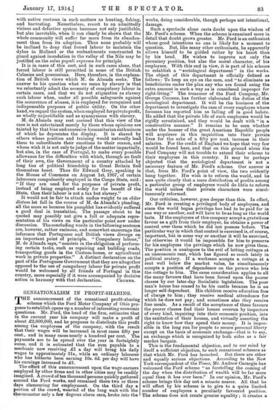WHAT IS SLAVERY?
Q IR ROBERT PEEL stated some seventy years ago that no sound opinions on currency questions could be formed unless a clear and comprehensive answer were given to the question, " What is a pound ? " M. Jose de Almada, the private secretary to the Portuguese Minister for Foreign Affairs, in an elaborate defence of the Portuguese administration of the islands of St. Thome and Principe, recently published by the National Printing Office at Lisbon, asks a somewhat similar question. Starting apparently with the assumption, which if not altogether erroneous is certainly exaggerated, that all those who in England take part in anti-slavery discussions allow their emotions to dominate their reason, he asks, " What is meant by slavery in all public meetings and Parliamentary debates ?" M. de Almada has a right to expect a definite reply to this very pertinent question.
In dealing with this subject M. de Almada quotes evidence from English sources to show that an Indian coolie in Jamaica does not attach the same signification to the word " slave " as an Englishman or a creole, inasmuch as he frequently addresses his employer in words, familiar to all residents in India, such as " Protector of the poor ! You are my father and mother ! I am your slave!" The use of such figurative language proves absolutely nothing. It may be classed with these forms, consecrated by custom, which constrain an English subordinate official, however little he may be distinguished for habits of obedience, humility, or servility, to describe himself in addressing his superior as his " most obedient, humble servant." M. de Almada further tells us that, just as in Egypt the worst evils of the comes system were cloaked under a euphemistic Arabic word signifying "assistance," so the Swahili expression for slave (Ifturawa) has "an honourable connection." It merely means " one who can be sent," and does not in the mind of the slave involve any degradation. " Whoever," M. de Almada adds, "is a little acquainted with Spencer's Sociology and Psychology will not be astonished at these quotations." Further, M. de Almada points out, in language which has been used by all apologists for slavery from the days of Demosthenes downwards but which constitutes no adequate defence for the institution, that slaves are generally well treated, that they are often better off as slaves than as free men, and that cases have occurred of manumitted slaves wishing to return to slavery. His general conclusion is that "the evils of the system are more or less everywhere the same, and that many things in the Portuguese colonies are criticized which are practised just in the same way abroad." It will presently be shown that there is one principle of vital importance which is apparently adopted in the Portuguese colonies, but which is absolutely rejected in all British possessions. But in the meanwhile attention may be drawn to the fact that, although M. de Almada adduces much evidence with a view to proving that, in dealing with indentured labour, Portuguese and British methods are identical, he does not himself make any attempt to define slavery. He is quite justified in the adoption of this course, for in truth any epigrammatic and sufficiently comprehensive defini- tion of the term is well-nigh impossible. As ho rightly observes, "European Anarchists and Socialists call' slaves ' the salaried workmen of our factories." From this point of view it may be said that the stage at which compulsion, whether physical or moral, to oblige-
an individual to work degenerates into the creation of the status of slavery, though an interesting subject for academic discussion at the bands of a sociologist, is of slight importance to the practical politician or adminis- trator. But it becomes a practical problem of the highest importance when the issue is stated in less general terms. When and under what conditions is forced labour justi- fiable? At what point is it synonymous with slavery, and may it justly incur the odium attached in all civilized communities to that degrading term ? These are the questiOns which in reality lie at the root of most of the controversies upon the modern aspect of slavery.
From time immemorial a distinction has been made between slavery and compulsory labour. Mr. Buckland, in his exhaustive work on The Roman Law of Slavery, points out that the expressions sereire and operas dare were not necessarily synonymous with slavery. More than this, as in a very primitive stage of society the institution of slavery may be said to have connoted. some degree of progress, inasmuch as it took the place of the wholesale slaughter of war prisoners heretofore practised, so also it may be held that further progress in the direction of civilization was achieved when, in the Middle Ages, slavery was transformed into serfdom. It was, however, against the abuses of the comes system, under which the French peasant was under an obliga- tion to give a certain number of days' labour to his feudal lord, that the fiery old " Ami des Hommes" launched some of his most forcible diatribes. The whole system, in its feudal aspect, was, of course, swept away by the Revolution, but was nevertheless speedily, although but partially, resuscitated in another form. It was found impossible to keep the public roads in order without recourse to forced labour. Hence a law was passed in the year X. of the Republic regulating what were called " prestations en nature." Under this enactment, which, with certain modifications, still remains in force, every adult Frenchman is under a legal obligation to render personal service for a period not exceeding three days in one year in order to maintain the public roads of the district in which he resides. This service may, however, be, and generally is, commuted into a money payment. Until very recently laws very similar in character were in force in the United Kingdom. Statutory labour on roads was only abolished in England in 1835, and survived in Scot- land till 1883.
If the necessity of resorting to forced labour has been recognized in modern times by such highly civilized com- munities as those of France and England, it can be no matter for surprise that the system should still exist in countries whose moral and material status is less highly developed. A. White Paper was presented to Parliament in January, 1908, showing to what extent compulsory. native labour was at that time employed in British Colonies and possessions. From this document it appears that in thirty- four Colonies no system of compulsory labour of any kind exists. In 1907, however, it still prevailed in Gambia, Ceylon, the Leeward Islands, the Gold Coast, Uganda, Fiji, British Honduras, Natal, and Cyprus. In each of these cases the conditions of labour are regulated by strict and elaborate laws, which are usually based on immemorial native custom.
Recourse to forced labour in any form, and under what- soever safeguards, is a manifest evil. Experience has shown that the system is peculiarly liable to abuse. In its practical working it requires to be supervised with the utmost vigilance and watchfulness. Moreover, it has been pointed out by those who are most qualified to speak on the subject that light obligations, ratified by native custom, which have been willingly borne from time immemorial, may be profoundly modified when they are applied to meet the requirements necessarily brought into prominence with the advent of Europeans and the creation of European wants. It is one thing to ask the inhabitants of a Central African village to keep open a narrow forest footpath and to maintain is few rustic bridges adapted to the use of pedestrians. It is altogether another thing to insist on the maintenance of reads and bridges suitable forvehicular traffic. Moreover, the E uroperut contractor or engineer, in formulating his demands for labour, is obviously less likely to regulate his require- meats in the manner most convenient to the labourers than' the headmen of the villages who are intimately acquainted-
with native customs in such matters as hunting, fishing, and harvesting. Nevertheless, resort to an admittedly vicious and defective system becomes not only justifiable, but also inevitable, when it can clearly be shown that the whole community will suffer far more from its abandon- ment than from its adoption. Thus none probably will be inclined to deny that forced labour to maintain the dykes in Holland or the embankments constructed to guard against inundation in the valley of the Nile may be justified on the sakes populi supremo ler principle.
It is in cases of this sort, and in such cases alone, that forced labour is still permitted in some of the British Colonies and possessions- Here, therefore, is the explana- tion of British views which M. de Almada seeks. The answer to his question what we mean by slavery is that we reluctantly admit the necessity of compulsory labour in certain cases, and that we do not stigmatize as slavery such labour when, under all possible safeguards against the occurrence of abuses, it is employed for recognized and indispensable purposes of public utility. On the other hand, we regard the system, when employed for privateprofit, as wholly unjustifiable and as synonymous with slavery.
M. de Almada may rest assured that this view of the case is not entertained merely by those whose opinions are tainted by that bias and excessive humanitarian enthusiasm of which he deprecates the display. It is shared by others whose position and training would naturally lead them to subordinate their emotions to their reason, and whose wish it is not only to judge of the matter impartially, but also, in the case of Portugal, to make every possible allowance for the difficulties with which, through no fault of their own, the Government of a country attached by long ties of political friendship to Great Britain find themselves beset. Thus Sir Edward Grey, speaking in the House of Commons on August 1st, 1907, of certain labourers compulsorily employed in the Congo State, said: "If they are used for the purposes of private profit, instead of being employed solely for the benefit of the State, then their labour is not a tax but slavery." It would not be fair to attach undue weight to an obiter diction let fall in the course of M. de Almada's pleading, all the more so because his pamphlet has evidently suffered a good deal in translation. The passage about to be quoted may possibly not give a full or adequate repre- sentation of his views on the particular point now under discussion. The concluding words in the following sentence are, however, rather ominous, and somewhat encourage the inference that Portuguese and British views diverge on an important point of principle. " Compulsory labour," M. de Almada says, " consists in the obligation of perform- ing certain tasks, such as repairing and building roads, transporting goods in the Custom-house, or agricultural work in private properties." A distinct declaration on the part of the Portuguese Government that they are altogether opposed to the use of compulsory labour for private profit would be welcomed by all friends of Portugal in this country, more especially if it were accompanied by decisive action in harmony with that declaration. Cnomna.











































 Previous page
Previous page